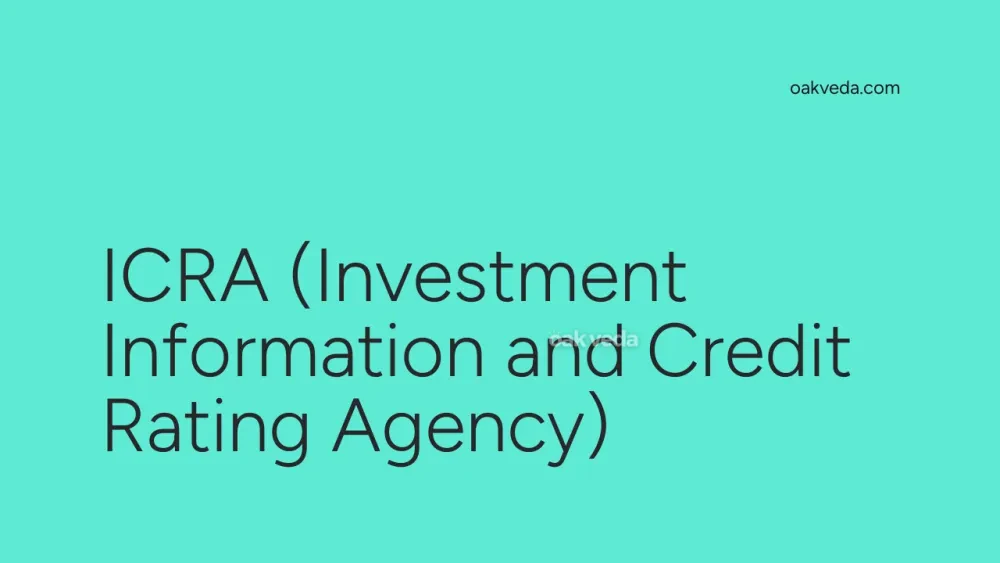
What is the Full Form of ICRA?
ICRA is the abbreviated form of Investment Information and Credit Rating Agency. This organization plays a crucial role in India's financial sector, providing valuable insights and ratings for various financial instruments and entities.
What is Investment Information and Credit Rating Agency?
Investment Information and Credit Rating Agency, commonly known as ICRA, is one of India's leading credit rating agencies. Established in 1991, ICRA has become an integral part of the country's financial ecosystem, offering a wide range of services to investors, lenders, and regulatory authorities.
Origin and Development of ICRA
ICRA was founded by a consortium of leading Indian banks, financial institutions, and investment companies. The organization was created to meet the growing need for independent and reliable credit ratings in India's rapidly evolving financial markets. Since its inception, ICRA has expanded its services and reach, becoming a trusted name in the industry.
How does ICRA work?
ICRA operates by analyzing various financial instruments, companies, and sectors to provide accurate and timely credit ratings. The agency employs a team of expert analysts who use sophisticated methodologies to assess the creditworthiness of entities and the risk associated with different financial products.
Functions of ICRA
ICRA performs several critical functions in the Indian financial market:
- Credit Ratings: Assessing the creditworthiness of various debt instruments and entities.
- Research: Conducting in-depth market research and analysis.
- Advisory Services: Offering guidance to investors and financial institutions.
- Risk Assessment: Evaluating potential risks associated with investments and financial products.
Applications of ICRA
ICRA's services find applications across various sectors of the economy:
- Banking and Financial Services: Assisting in credit risk assessment and portfolio management.
- Corporate Sector: Providing ratings for bonds, commercial papers, and other debt instruments.
- Government and Public Sector: Evaluating the financial health of public sector undertakings and government projects.
- Infrastructure: Assessing the viability and risks of infrastructure projects.
Features of ICRA
Some key features that set ICRA apart include:
- Independence: Maintaining objectivity in its ratings and assessments.
- Expertise: Employing a team of seasoned professionals with deep industry knowledge.
- Comprehensive Coverage: Offering ratings and research across various sectors and financial instruments.
- Global Perspective: Leveraging its alliance with Moody's Investor Service for international insights.
Benefits of ICRA
ICRA's services provide numerous benefits to the financial ecosystem:
- Informed Decision-Making: Investors and lenders can make better-informed choices based on ICRA's ratings and research.
- Market Transparency: ICRA's assessments contribute to increased transparency in financial markets.
- Risk Mitigation: By identifying potential risks, ICRA helps stakeholders take appropriate measures to mitigate them.
- Capital Access: ICRA's ratings can help companies access capital markets more effectively.
Limitations or Challenges of ICRA
Despite its strengths, ICRA faces certain challenges:
- Market Volatility: Rapid changes in market conditions can affect the accuracy of long-term ratings.
- Information Asymmetry: Reliance on information provided by rated entities can sometimes lead to discrepancies.
- Regulatory Scrutiny: As a key player in the financial sector, ICRA is subject to intense regulatory oversight.
Future Developments in ICRA Technology
ICRA is continuously evolving to meet the changing needs of the financial markets. Some potential future developments include:
- AI and Machine Learning: Incorporating advanced technologies for more accurate and timely ratings.
- ESG Integration: Expanding focus on Environmental, Social, and Governance factors in ratings.
- Real-time Analytics: Developing tools for more frequent and dynamic credit assessments.
FAQs on ICRA Full Form
-
What does ICRA stand for? ICRA stands for Investment Information and Credit Rating Agency.
-
When was ICRA established? ICRA was established in 1991.
-
Is ICRA a public company? Yes, ICRA is a public limited company listed on both the Bombay Stock Exchange (BSE) and the National Stock Exchange (NSE).
-
What is ICRA's relationship with Moody's? Moody's Investor Service is one of the main shareholders of ICRA, providing an international alliance for the Indian agency.
-
What types of instruments does ICRA rate? ICRA rates various instruments including rupee-denominated debt instruments issued by banks, financial institutions, manufacturing firms, and government sector undertakings.
In conclusion, ICRA, or Investment Information and Credit Rating Agency, plays a vital role in India's financial markets. By providing reliable credit ratings, research, and advisory services, ICRA contributes significantly to the transparency and efficiency of the country's financial ecosystem. As the markets continue to evolve, ICRA's role in providing valuable insights and assessments will remain crucial for investors, lenders, and regulatory authorities alike.
You may be interested in:

